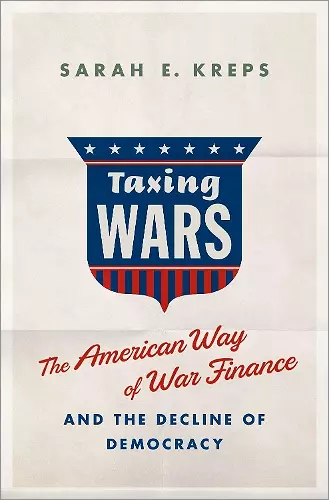Taxing Wars
The American Way of War Finance and the Decline of Democracy
Format:Hardback
Publisher:Oxford University Press Inc
Published:26th Jul '18
Currently unavailable, and unfortunately no date known when it will be back

Shortly after speaking with a bullhorn amidst the still-smoking wreckage at the World Trade Center site, President George W. Bush urged Americans to 'get down to Disney World in Florida...take your families and enjoy life, the way we want it to be enjoyed.' Americans, he implied, should not merely offer sacrifices but return to normalcy. Consistent with this anecdote, his administration cut taxes, and held of efforts by a renegade group of anti-war Congress members to introduce a 'share the sacrifice' war tax for Iraq in 2007. According to the tax's opponents, Americans were already being 'taxed to death.' The ultimate result of all of this is that the government has financed the wars in Iraq and Afghanistan entirely through borrowing. As Sarah Kreps shows in Taxing Wars, the type of debt financing for war that we have seen since 9/11 could not have been more different from earlier experiences when wars meant taxation. For instance, in 1914-three years before America's direct involvement in World War I-President Wilson urged war taxes as a way to fund defense preparations. Indeed, the Wilson Administration levied a series of war taxes before, during, and after the war, amounting to about one-third of the war's costs. Why, when Wilson was aiming to recruit rather than repel support for the war, did he introduce measures such as a hefty war tax that recent leaders have considered politically toxic? Why was the public so magnanimous in its willingness to contribute its own resources? By contrast, why did leaders not use the crisis of war, often used as entrées for introducing war taxes in the past, in the aftermath of 9/11 to extract resources from the populace in a way that been customary in the past? More generally, what explains shifting attitudes towards bearing the financial burden of war and the move away from war taxes, and the consequences of that shift? Kreps argues that the starkly different approaches are the result of public attitudes towards wartime fiscal sacrifice that vary depending on the underlying type of war and state-society relations. The public accepted the sacrifices that the state demanded during the two world wars, an effect of both the nature of those wars and the public's more favorable views toward government...
Funding is, of course, essential to conducting almost any war. And as Sarah E. Kreps, the author of TAXING WARS: The American Way of War Finance and the Decline of Democracy points out, war taxes are an especially American issue . . . [Kreps] concludes that there now exists a broad, quiet political consensus to insulate the American people from the human and financial costs of their wars. This agreement is insidious, she writes, because it has undermined democratic accountability. * THE NEW YORK TIMES *
ISBN: 9780190865306
Dimensions: 239mm x 163mm x 31mm
Weight: 544g
336 pages